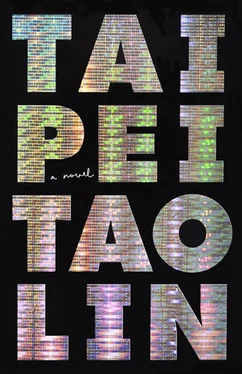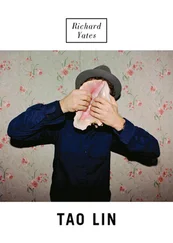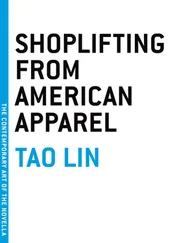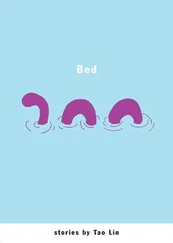In Type Books people stood in an encroaching half circle around a nervously grinning Paul, seated on a stool, “completely exposed,” he felt, as an employee read a long, admiring, complicated introduction that seemed like it had incorporated sections of a dissertation. Paul, appearing sometimes openly frightened, honestly answered “I don’t know” for almost every question during the Q&A, then in each ensuing silence, feeling pressure to elaborate, mumbled sentence fragments he knew were untrue or inaccurate before, in closing, reiterating “I don’t know.” Near the end, while saying “but I don’t really know,” he stuttered a little. After the reading he went to a restaurant with four Type Books employees and their friend Alethia, 22, who had published around six hundred articles since leaving college two years ago to write for Toronto’s leading alt weekly. Paul asked if Alethia, whom he felt attracted to and curious about, wanted to interview him while, as a journalistic angle, he was “on MDMA.”
In Rodrigo’s apartment, a few hours later, Paul searched his name in Alethia’s email account — signed in on Rodrigo’s tiny, malformed-looking, non-MacBook laptop — while she was in the bathroom and saw she had pitched an article on him, two months ago, to the Toronto Sun, who had not responded, it seemed. Paul and Rodrigo each swallowed a capsule of MDMA. Paul said he felt “nothing” and swallowed another and, when it began taking effect, repeatedly encouraged Alethia to also ingest MDMA, “for the interview,” but she declined, citing that when she tried LSD she rode a bus around Toronto for five hours. Rodrigo lay with his girlfriend on his bed as Paul and Alethia sat on beanbags on the floor and talked for two and a half hours, during which Paul sometimes wanted to hug or kiss Alethia, whose default expression, it seemed, was “worried,” sometimes in an endearingly doe-like manner and sometimes like it was an effect of her job, as a full-time journalist, with its deadlines and copyediting, Paul thought half sarcastically more than once. Alethia said “you were saying you’ve been doing readings on drugs because it makes you feel more comfortable” and asked why.
“Um, actually, I just think it’s more fun.”
“More fun for you, or the people who are there?”
“In my view it’s more fun for everyone,” said Paul.
“So when you did that reading a few weeks ago on mushrooms. . you stopped after two minutes?”
“Um,” said Paul. “Two minutes?”
“Yeah. Is that what happened?”
“What reading?”
“Oh. I don’t know. . a few weeks ago.”
“The Booksmith?”
“Yeah. In San Francisco.”
“Oh. I was seeing ‘tribal patterns’ on the paper, because I was staring at it on mushrooms, and I felt like I was sweating, and I kept thinking ‘Hunter S. Thompson.’ Then I felt like I couldn’t go on anymore. I was preparing to say something like ‘I’m having a bad drug experience, I need to go home.’ But I looked up, at the people, and regained control.”
An hour later they were discussing a recent trend of Megabus accidents, described by Paul, who was riding a Megabus to Manhattan tomorrow, as “like, twenty people dying five times in the last few days,” when Alethia asked if Paul was worried he’d be “the next to die.”
“No. I don’t care if I die.”
“Um,” said Alethia laughing.
“I feel like I honestly don’t care if I die.”
“Really? You’re not worried about dying?”
“No, I think. I’m ready to die whenever.”
“Because you’ve written enough books?”
“No, no,” said Paul shaking his head a little. “I don’t know. I’m just ready to die. Life just seems like. . it’s fine if I die. Once I’m dead I’m dead.” Rodrigo from his bed said “but in an interview you talk about eating healthy and not smoking because you’ll be more productive.” Paul said health and drugs and being productive were all in service of feeling good. Alethia said she took Ritalin almost every day, from ages 8 to 12, for “attention deficit disorder.” Paul said “that seems horrible” and “that must’ve changed you.”
“Yeah, I think it did,” said Alethia. “I think it did.”
“People who take the most drugs by far are the kids—”
“It’s so true,” said Alethia.
“—who get prescribed them,” said Paul.
“Who’s, like, your closest friend?”
“I just felt, like. . really alone when you said that.”
“Oh no! I’m sorry.”
“Wait, there has to be someone,” said Paul grinning. “I feel like I have close friends but we stop talking. Right now, I guess, what person do I feel closest to?”
“Yeah,” said Alethia.
“Um, I can’t remember right now. I feel close to different people over sets of days. Like if I’ve been texting someone, but then I’ll forget about them.”
“Do you sometimes feel like it sucks — to just, like, live in the world?”
“What do you mean?” said Paul slowly.
“Like, that the world can’t provide us with enough to satisfy us.”
“No,” said Paul after around ten seconds, and covered his face with his hands. “I mean. . the world is good enough, based on evidence, because I haven’t killed myself. Like, if I killed myself. . I could say the world is bad, on average.”
“Like definitively,” said Alethia.
“On average,” said Paul through his hands. “Since the urge to kill myself isn’t so strong that I actually kill myself, the world is worth living in.”
• • •
Alethia left around 4:30 a.m., easily declining Paul’s suggestions, bordering on “pleas,” he felt, that she stay. Rodrigo and his girlfriend seemed asleep. Sitting on a sofa, in the common room, Paul texted Alethia: “This is Paul. Good night, glad we met.” Alethia responded: “Me too. You are wonderful.” Paul lay on the sofa, bristling with wakefulness, for around forty minutes, then put his MacBook in his backpack and wrote a two-sentence note to Rodrigo and walked outside into a silvery, wintry light.
On a Megabus to New York City — for around fifteen hours, due to a two-hour delay in Buffalo — he read all he could find by Alethia on the internet, becoming more “obsessed,” he felt, after each article, lying on his back across two seats with knees bent, twice dropping his iPhone onto his face. His interest in Alethia naturally decreased, the next few days, then they texted a few times and he felt renewed obsession, but he didn’t like her impersonal tone in their emails discussing their interview — which she’d spent eight hours transcribing — and, less than a week after they met, all he felt toward her, to his weak amusement, was an unexamined combination of indifference and vague resentment, which he described in an email to Charles, whose previous knowledge of Alethia was that Paul liked her “a lot,” as “strong aversion,” only half joking. Paul’s next email to Charles said “I feel like I ‘hate’ her” and that it seemed, by the bureaucratic language and curtness of Alethia’s emails, like she also “hated” him, that they “hated” each other.
On Halloween afternoon, in the library, Paul read an account of his Montreal reading, when he was on two capsules of MDMA, describing him as “charismatic, articulate, and friendly.”
He read an account of his Toronto reading, when he’d been sober, describing him as “monosyllabic,” “awkward,” “stilted and unfriendly” within a disapproval of his oeuvre, itself vaguely within a disapproval of contemporary culture and, by way of a link to someone else’s essay, the internet.
After his book tour’s last reading, on November 4, in Baltimore, Paul declined multiple dinner and bar invitations and went with Erin to her apartment — a bedroom, bathroom, tiny kitchen, TV room — where, using iMovie on Erin’s MacBook, they recorded themselves on MDMA answering questions each had prepared for the other, then continued recording, sitting on Erin’s bed, as they showed each other things on the internet, wanting to later be able to see how they behaved while on MDMA. Erin’s iPhone made a noise, at one point, and Paul, who had wrapped himself in a thick blanket, asked if it was Calvin.
Читать дальше












